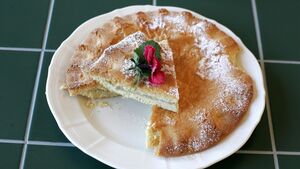It's time to revive an Irish baking tradition

You can tell everything you need to know about a culture by what it keeps in the larder for emergencies. The French hoard tinned pâté. Americans stockpile granola bars. The British maintain a strategic reserve of digestive biscuits. But the Irish? We keep apple tarts. Not one, mind you, but two - one for eating and one for freezing against the inevitable arrival of someone who needs feeding, consoling, or simply acknowledging as human.
This is not mere domestic planning. This is a form of social insurance, a hedge against the catastrophe of being caught unprepared when life comes calling. Because life, as any self-respecting Irish person knows, has a habit of turning up unannounced, usually when you're least prepared and most in need of something sweet to soften the blow.
The apple tart occupies a curious position in Irish kitchens. It's not grand enough to count as showing off - no one's going to mistake it for French patisserie - but it's several notches above the sort of thing that screams poverty cooking. Instead, it sits in that sweet spot where real hospitality happens. It's your mother's best cardigan in food form - hardly wins any beauty contests, but exactly what you want when the world's gone sideways and comfort trumps everything else.
Walk into any Irish kitchen worth the name and you'll find the evidence of this national obsession. The particular mixing bowl, slightly cracked but irreplaceable. The wooden spoon, scarred by decades of faithful service. The pie dish that's seen more action than a wartime correspondent.
These are not mere cooking implements but the tools of a sophisticated social system that operated long before we had mobile phones to announce our arrivals.
There was a time - not so long ago that the memory has faded completely - when Irish social life ran on what sociologists might call "spontaneous intersection theory", though we called it dropping in. No advance warning required. No careful coordination of calendars. You just turned up. Maybe you had news to share, maybe you needed cheering up, or maybe you'd simply run out of people to talk to at home. Whatever the reason, the apple tart did the heavy lifting, it turned what might have been an awkward interruption into something approaching a proper visit.
The genius of this arrangement was its democratic accessibility. Dinner parties need planning, shopping lists, and the kind of optimism that assumes nothing will go wrong between Tuesday and Saturday. Apple tarts just need whatever's already in the press - flour, margarine, sugar, eggs, and whichever apples haven't made a break for it from the fruit bowl. This wasn't cooking to impress anyone. This was cooking because someone might need feeding.
Our apple tart has surprisingly ancient roots. Medieval monks, apparently with time on their hands and orchards to manage, started mucking about with something they called "Tarte aux pommes". Being monks, they wrote everything down - probably between prayers and whatever else monks did all day. So we've got apple tart recipes dating back to the 1300s, all thanks to some very organised religious types with a sweet tooth. From there, the recipe migrated, mutated, and eventually washed up on Irish shores, where it underwent the peculiar alchemy that transforms foreign imports into national treasures.
The transformation wasn't dramatic - we've never been ones for culinary theatrics. The Irish version unfolded as these things often do through countless women making countless tarts, each one tweaking it slightly until all the fussy bits were dropped and only the functional parts remained. We ditched the fancy French nonsense and concentrated on the important question: how do you get something decent on the table without spending all day at it?

This process of cultural adoption reveals something essential about the Irish character. We're brilliant at taking other people's ideas and making them more practical, more human, more suited to the realities of daily life. The apple tart is Exhibit A in this argument - French in origin, perhaps, but Irish in spirit, function, and social purpose.
And there was something in that simple alchemy, passed from mother to daughter, that expressed character. My grandmother's apple tart was to die for, always repeated to the same perfection, never again to grace a table once her hands rested. My mother's differed slightly, more robust, but repeated to fill endless hungry mouths. Its distinct taste and texture also rests with her. I have never known two women, even given the same exact ingredients, to produce an identical tart.
Eating apple tart isn't just about the sugar rush, though that's pleasant enough. It's also about doing something your grandmother did, and her grandmother before her, all of them understanding that being ready to feed people wasn't something you scheduled into your diary but just how you lived. That tart sitting on the windowsill meant more than pudding after dinner. It was a sort of flag - this house has its act together, and if you need feeding, consoling, or just somewhere to sit for five minutes, you're sorted.
Modern life has largely abandoned this beautiful system. We've replaced spontaneous visits with scheduled playdates and impromptu gatherings with carefully curated dinner parties. The unexpected guest has become an inconvenience rather than an opportunity. We've gained efficiency and lost something essential - the sense that human connection shouldn't require advance booking.
Perhaps this is why the apple tart deserves rehabilitation. In our hyper-scheduled, over-connected age, arriving unannounced with something homemade represents a form of radical hospitality. It suggests a willingness to prioritise human connection over digital convenience, spontaneity over efficiency, and presence over productivity.
The sensory memory of apple tart operates like a memory switch. Cinnamon, cloves and baked apples hit you like a time machine - suddenly you're eight again, standing in your mother's kitchen, knowing without being told that someone cared enough to bake for you. Some foods just do that, don't they? They bypass your brain entirely and go straight for the jugular of memory.
Making an Irish apple tart says a lot about us, really. You start with basic pastry - nothing fancy, just something that holds together well. Then you load it up with apples because we're not stingy people, but we're not show-offs either. Maybe a bit of cinnamon and cloves in winter, but not much. The whole point is that you still taste the apples. We like our food to be what it says it is - better than usual, sure, but recognisably itself.
This distinguishes our tart from its international cousins. The Dutch make theirs more like cake - very prosperous-looking. Americans turned it into some sort of patriotic statement. The French, naturally, make it look like it belongs in a museum. Ours just wants to be eaten without any fuss. Which is probably why it works.
The recipe was handed down from mother to daughter, usually while standing elbow-deep in flour, rather than from any cookbook. The measurements are brilliantly useless - "enough margarine until it feels right", "however many apples fit", etc. None of this weighing and measuring nonsense. You learned by watching, by getting it wrong a few times, by developing what your granny would have called "the feel for it".
In our current moment, when food has become increasingly politicised and medicalised, the apple tart offers sanctuary. It makes no health claims, follows no dietary trends, serves no agenda beyond comfort and connection. It's neither a superfood nor a guilty pleasure but something more valuable - reliable constancy in an unreliable world.
The time has come to reclaim this tradition. The unexpected visitor needn't remain a relic of pre-digital life. Time to raid the flour tin, find some decent margarine, and work up the bottle to just appear on someone's doorstep. Our grandmothers might have been onto something - it's hard to feel lonely when someone's forcing tea and cake on you, especially if the tea's strong enough to wake the dead.
Against that backdrop, just showing up with something you've baked feels like you're planning a coup. Overthrow the system, armed only with one pastry at a time.




